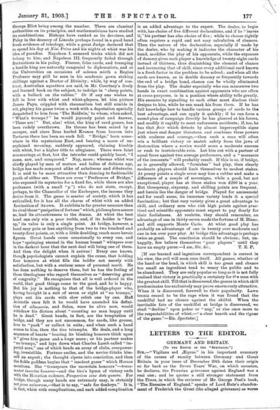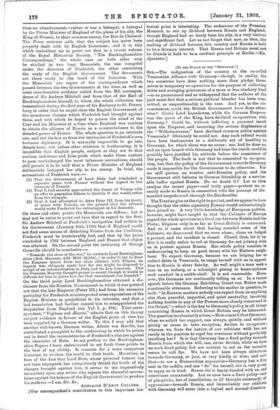LETTERS TO THE EDITOR,
• GERMANY AND BRITAIN.
[TO THE EDITOR OP THH " SPROTATOR."1
Bra,—" Vigilans sad Aquus" in his important summary of the causes of enmity between Germany. and Great Britain in your issue of December 20th dates their origin so far back as the Seven Years' War, on which occasion, he declares, the Prussian grievance against England- was a real one ; and he quotes a still stronger statement from the Times, in which the reviewer of Mr. George Peel's book, " The Enemies of England," speaks of Lord Bute's abandon- ment of Frederick the- Great (the alleged grievance) as worse •
than an abandonment,—rather it was a betrayal, a betrayal by the Prime Minister of England of the plans of his ally, the King of Prussia, to their common enemy, the Due de ChoiseuL
The Times reviewer adds that the subject has never been properly dealt with by English historians ; and it is this which emboldens me to point out that in a recent volume of the Royal Historical Society, "The Buckinghamshire Correspondence," the whole case on both sides may be studied in two long Memorials, the one compiled under the direction of Frederick, the other containing the reply of the English Government. The documents are there ready to the hand of the historian. With the Memorials are copies of the correspondence which passed between the two Governments at the time, as well as some corroborative evidence culled from the MS. correspon- dence of Sir Andrew Mitchell and from that of the Earl of Buckinghamshire himself, to whom the whole collection was transmitted during the first year of his Embassy to St. Peters- burg in order that he might clear the English Government of the monstrous charges which Frederick had brought against
them, and with which he hoped to poison the mind of the Czar and his Ministers at a time when England was anxious to obtain the alliance of Russia as a counterbalance to the dreaded power of France. The whole question is an intricate one, and not the less so from the intricacies of Frederick's own tortuous diplomacy. It is naturally impossible to go into details here; but unless other evidence is forthcoming, it is incredible that English people, subject as they are to that curious indolence and false pride which make them content to pass unchallenged the most infamous accusations, should still permit it to be said that a Prime Minister of England deliberately betrayed her ally to his enemy. In brief, the accusations of Frederick were :—
(1) That the Government of Lord Bute had concluded a separate peace with France without due regard to the interests of Prussia.
(2) That it had secretly approached the Court of Vienna with an offer to guarantee Silesia to Austria if she would retire from the struggle.
(3) That it had attempted to deter Peter III. from his treaty of peace with Prussia, on the ground that the alliance would make Frederick too extravagant in his demands.
On these and other points the Memorials are diffuse; but it may not be amiss to point out here that in regard to the first, Sir Andrew Mitchell at Frederick's instigation had written to his Government (January 16th, 1760) that if England could not find some means of detaching France from the Coalition, Frederick must be irretrievably lost, and that by the peace concluded in 1762 between England and France that object was attained. On the second point the testimony of George Grenville should be conclusive :—
" Towards the close of the war," he writes to Lord Buckingham- shire (Brit. Museum, Add. MSS. 22,358), "in order to try to draw the Empress Queen from her close alliance with France, an inquiry was obliquely made how far she might be disposed to accept of an indemnification in Italy and the Low Countries. This his Prussian Majesty thought proper to resent, though it would be difficult for him to prove how far that resentment was founded."
On the third point Lord Buckinghamshire obtained a dis- claimer from the Russian Government in which it was pointed out that the late Emperor (Peter III.) had from his excessive partiality for Frederick misinterpreted some expressions of the English Minister as prejudicial to his interests, and that a bad translation had further caused him to misapprehend the despatches from England (see Vol. I., p. 194). Your corre- spondent, " Vigilans sed Aquas," admits that on this thorny subject evidence in favour of the English point of view has
been supplied by a German writer. To this I may add that another well-known German writer, Albert von Ruville, has
contributed a pamphlet to the controversy in which he points out in detail the inconsistencies of Frederick's charges against the character of Bute. In my preface to the Buckingham- shire Papers I have endeavoured to set forth these points to the best of my ability. It remains for a more competent historian to awaken the world to their truth. Meantime, in face of the fact that Lord Bute, whose personal honour has not been impugned, has categorically denied the truth of the
charges brought against him, it seems to I me imperatively incumbent upon any writer who repeats the shameful accusa- tions against the honour of the English Government to produce his evidence.—! am, Sir, &c.,
ADELAIDE D'ARCT COLLYER.
[Our correspondent's contribution to this important his- torical point is interesting. The endeavour of the Prussian Monarch to stir up ill-blood between Russia and England, though England had so lately been his ally, is a very curious and significant fact. Let us not forget that now, as then, the making of ill-blood between this country and Russia is held to be a German interest. That Russia and Britain must not be friends is held to be a cardinal principle at Berlin.---En. Spectator.]























































 Previous page
Previous page